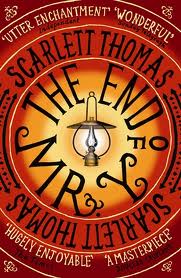Our book choice for December 2007 is The End of Mr. Y by Scarlett Thomas. A cursed book. A missing professor. Some nefarious men in gray suits. And a dreamworld called the Troposphere?
Ariel Manto is a PhD student who is fascinated by the work of the 19th century writer Thomas Lumas. She has been researching Lumas for years, and she is thrilled when she finds a copy of his rare novel The End of Mr. Y in a second-hand bookshop.
The novel is said to be cursed, and everyone who has read it has died not long afterwards. Ariel is determined to read the book, even though she knows the risks. She starts reading the novel, and she is immediately drawn into its strange and unsettling world.
The novel tells the story of a man named Mr. Y, who discovers a way to enter a parallel universe called the Troposphere. The Troposphere is a place where all consciousness is connected, and where people can travel through time and space using the thoughts of others.
As Ariel reads the novel, she begins to have strange experiences. She starts to see things that aren’t there, and she feels like she is being followed. She soon realizes that she is being drawn into the Troposphere herself.
Ariel meets a group of people who know about the Troposphere, and they tell her that she is the only one who can stop a dark force from destroying the world. Ariel must use her newfound powers to travel through time and space, and to stop the evil that threatens to destroy everything.
Along the way, Ariel learns more about herself and about the world around her. She discovers that the Troposphere is not just a place of danger, but also a place of great beauty and possibility. She also learns that the power of the mind is far greater than she ever imagined.
Some of the key themes of the book:
- The power of language: The book explores the idea that language can create reality. The Troposphere is a world that is created by the thoughts of its inhabitants, and it can be changed by the words that people speak.
- The nature of consciousness: The book also explores the nature of consciousness. Ariel’s experiences in the Troposphere challenge her understanding of what it means to be conscious, and she begins to question the boundaries between self and other.
- The possibility of time travel: The book also raises the possibility of time travel. Ariel is able to travel through time in the Troposphere, and she learns about events that happened in the past. This raises the question of whether or not time travel is possible in the real world.
Discussion Questions
- If you knew a book was cursed, would you read it?
- Let’s assume the book’s posit follows – that thoughts alone create a paraidigm for us to explore. What would that mean?
- Why does distance equal time in the Troposphere?
- Sex is brutish in most of the book, why does the author present it this way and how does this contrast with the final scene?
- What does it mean: to experience the troposphere is also to express it?
- Is God made from the thoughts of people? Or are people made from the thoughts of God?
- The protagonist feels more comfortable alone than with people? Is this realistic?
- What happens to Adam?
- Why does the God in Ariel’s world appear as a mouse?
- What do you think of the Epilogue?
- In what genre does this book fall?
- Did this book inspire you to read other philosophy?
- What are the themes of The End of Mr. Y?
- How does the novel explore the relationship between reality and fiction?
- What is the role of homeopathy in the novel?
- What is the meaning of the title, The End of Mr. Y?
- What is the significance of the number 7 in the novel?
- What is the relationship between Ariel and her advisor, Romeo?
- How does The End of Mr. Y challenge our understanding of time and space?
- What is the novel’s commentary on the nature of reality?
- How does the novel explore the relationship between the individual and society?
- What is the novel’s critique of the academic world?
- How does the novel use humor to explore serious themes?
- What is the novel’s feminist message?

